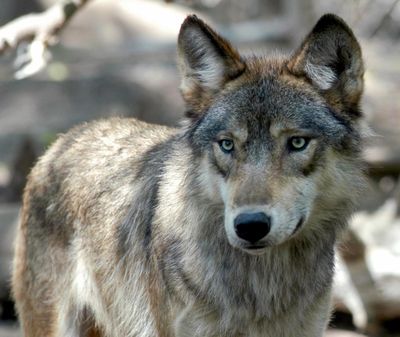Spokane conservationist: Plan to end wolf protections premature, political

BILLINGS – U.S. wildlife officials plan to lift protections for gray wolves across the Lower 48 states, a move that Chris Bachman, wildlife program director at the Spokane-based Lands Council, called premature and politically motivated.
“Truly the wolves are this weird trigger point, because science has taken a back seat historically to politics and social acceptance or social tolerance,” Bachman said. “Science should be what drives scientific decisions, not politics or sociology.”
The proposal would give states the authority to hold wolf hunting and trapping seasons. It was announced Wednesday by acting Interior Secretary David Bernhardt at a wildlife conference in Denver.
Chase Gunnell, communications director of Conservation Northwest, said because of laws that already exist in Washington, a federal delisting wouldn’t have a large impact on the Washington wolf population.
“We have a scientifically sound wolf conservation and management plan that was developed through years of stakeholder input from environmentalists and animal rights advocates to ranchers and farmers and hunters,” Gunnell said. “That wolf management and conservation plan will still be in place and it will still protect gray wolves as a state endangered species.”
Washington Department of Fish and Wildlife also said Washington’s plan would remain in place.
“We are prepared for this proposal, as we have an existing wolf conservation and management plan that covers all of Washington state,” Mick Copeland, Fish and Wildlife deputy assistant director, said in a statement. “Should the federal delisting move forward, wolves will still remain listed by the state as an endangered species. We would continue to work closely with our partners, stakeholders, and communities – just as we have over the past decade – on the recolonization of wolves in Washington.”
Gunnell said the delisting would shift the responsibility of prosecuting wolf poachers to state and local officials.
“We think that it’s really important that those state officials and our state justice system keep a watchful eye on any wolf poaching cases and hand out severe sentences as appropriate for any wolf poachers, given the scarcity of the species,” Gunnell said.
Gunnell said he empathizes with the concerns of conservationists in places like Colorado and California, where there is not a significant wolf population.
Bachman brought up Colorado as an example of a place that would be seriously hurt by the federal delisting, a place that he said was trying to establish a wolf population.
“They have to make it through Wyoming and Idaho to get to Colorado, and that simply won’t happen,” Bachman said.
Wolves had previously lost federal protections in Montana, Idaho and Wyoming, where hunters and trappers now kill hundreds of the animals annually.
Government officials said the recovery of wolves from widespread extermination in the last century has worked and they no longer need the Endangered Species Act to shield them. The Endangered Species Act states that a species needs to be recovered within a significant portion of the animal’s range. Bachman said that by that measure, the wolf is not recovered.
“There’s no way that the population in the Rocky Mountains will ever join with the population in the Great Lakes region, so they will remain subpopulations, and you can’t delist subpopulations, which is truly what this effort is about,” Bachman said.
Further details about the delisting were expected during a formal announcement planned in coming days.
“I’m biased because it’s my internal belief system, but that’s the paramount responsibility moving forward, to hand over to my kids – and my grandkids, eventually – a planet with the same life on it and in the same condition when I got it, if not better,” Bachman said. “We’re not on that path, and it’s troublesome.”